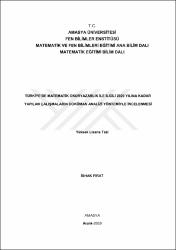Türkiye'de matematik okuryazarlık ile ilgili 2020 yılına kadar yapılan çalışmaların doküman analizi yöntemiyle incelenmesi

View/
xmlui.dri2xhtml.METS-1.0.item-rights
info:eu-repo/semantics/openAccessDate
2020Metadata
Show full item recordAbstract
Günümüzde bilimsel, mesleki, sosyal hatta günlük hayatımızın hemen hemen her kesiminde matematik ve buna bağlı olarak matematik okuryazarlığından bahsetmek mümkündür. Matematik günlük hayatımıza bu kadar nüfuz etmiş olmasına karşın ne yazık ki en başarısız olunan derslerin başında gelmektedir. Matematik okuryazarlık, Ekonomik İşbirliği ve Kalkınma Teşkilatı kısa adı ile OECD'nin 2000 yılında uygulamaya koyduğu Uluslararası Öğrenci Değerlendirme Programı kısa adı ile PISA'nın literatüre kazandırdığı bir kavramdır. Matematik okuryazarlığı, öğrencilerin okulda müfredattan, okul dışında ailesinden veya dış çevresinden öğrendiği matematik bilgi ve becerilerini özümseyip, içselleştirerek hayatının herhangi bir kesitinde karşılaşacağı problemlere yapıcı, yansıtıcı, eleştirel ve somut çözümler üretebilme kapasitesidir. Kısacası matematik okuryazarlık, matematiği hayata entegre edebilme becerisidir. Türkiye, kurucu üyesi olduğu OECD'nin 2000 yılında uygulamaya koyduğu PISA sınavlarına 2003 yılından bu zamana kadar düzenli olarak katılmaktadır. PISA uygulamaları sonucunda oluşturulan raporlardan elde edilen sonuçlara göre ülkemiz katıldığı bütün uygulamalarda OECD üye ülkeleri ortalamasının altında kalarak son sıralarda yer almaktadır. Bu durum ülkemizin matematik okuryazarlığını bir tartışma ve araştırma konusuna dönüştürmüştür. Bu noktadan hareketle 2000'li yıllardan itibaren ülkemizde yapılmış matematik okuryazarlık çalışmaları tespit edilmiş ve bu çalışmaların, matematik okuryazarlığını hangi boyutuyla ele aldıkları, amaçları, yöntemleri ve öğrenme çıktıları tespit edilerek matematik okuryazarlık çalışmalarının hangi yönde eğilim gösterdiği belirlenerek genel bir çerçeve oluşturulmaya çalışılmıştır. Araştırmanın amacına uygun olarak bu çalışmada doküman analizi yöntemi kullanılmıştır. Bu çalışmada matematik okuryazarlık açısından Türkiye'nin durumunun belirlenmesi ve bu becerilerin geliştirilmesi için ne tür yöntemler kullanıldığına odaklanılmıştır. Bu nedenle çalışmanın kapsamı nicel ve karma yöntemlerle yapılan araştırmalarla sınırlı tutulmuştur. Yapılan araştırmada öngörülen ölçütler doğrultusunda ULAKBİM makale veritabanı ve YÖK TEZ veritabanında bulunan makale ve tezler taranmıştır. Tarama sonucunda ulaşılan çalışmaların 44 tanesinin direkt matematik okuryazarlıkla ilgili olduğu tespit edilmiştir. Matematik okuryazarlıkla alakalı makale ve tezler incelendiğinde çalışmaların büyük çoğunluğunda amaç öğrencilerin matematik okuryazarlık düzeylerinin belirlenmesidir. Yöntem olarak ise genellikle tarama ve ilişkisel tarama yöntemi kullanılmaktadır. Çalışmalar genel olarak son yıllara doğru artış göstermektedir ve öğrenme çıktıları açısından ülkemizin genel olarak matematik okuryazarlık düzeyinin normal olduğu ve geliştirilmesi gerektiği sonucuna ulaşılmıştır. Bu alanda yapılacak çalışmaların nitelikli şekilde artarak devam edebilmesi için araştırmacılara önerilerde bulunulmuştur. Today, it is possible to talk about mathematics and mathematics literacy in almost every part of our daily, scientific, professional, social and even daily life. Although mathematics has penetrated our daily lives so much, it is unfortunately one of the most failed courses. Mathematics literacy is a concept introduced to the literature by PISA under the short name of the International Student Evaluation Program which the OECD implemented in 2000 under the short name of the Organization for Economic Cooperation and Development. Mathematical literacy is the capacity of students to construct constructive, reflective, critical and concrete solutions to the problems they will face in any part of their life by assimilating and internalizing the mathematical knowledge and skills they learn from the curriculum, family or outside environment at school. Inshort, mathematics literacy is the ability to integrate mathematics into life. Turkey has been participating regularly since 2003 in the PISA exams, which were implemented in 2000 by the OECD, of which it is a founding member. According to the results obtained from the reports generated as a result of PISA applications, our country ranks below the average of OECD member countries in all the applications. This situation turned the mathematical literacy of our country into a topic of discussion and research. From this point of view, mathematical literacy studies carried out in our country since 2000s were determined and a general framework was tried to be formed by determining the extent to which these studies deal with mathematics literacy, their aims, methods and learning outcomes and by determining the direction in which mathematics literacy studiest end. Inaccordance with the aim of the study, document analysis method was used in this study. In this study, we focused on determining the situation of Turkey in terms of mathematics literacy and what methods are used to develop these skills. For this reason, the scope of the study was limited to the quantitative and mixedmethods. Inline with the criteria foreseen in the research, the articles and theses in The Turkish Academic Network and Information Centre (ULAKBIM) article database and the Databases of National Thesis Center of the Council of Higher Education were searched. As a result, 44 of the studies reached were directly related to mathematics literacy. When the articles and theses related to mathematics literacy are examined, the aim of the majority of studies is to determine the mathematical literacy levels of the students. As a method, descriptive survey and corelational survey method are generaly used. Studies have generally been increasing towards recent years and it has been concluded that the mathematical literacy level of our country is normal and needs to be improved in terms of learning outcomes. Suggestions were made to the researchers in order to continue the studies in this field in a qualified manner.
URI
https://tez.yok.gov.tr/UlusalTezMerkezi/TezGoster?key=Eb5EkakJlp3olBdo_wNEGWwk6ZPAMZ9UCJtVxoaZztrC0U_txao5iyyqSWMmY2vyhttps://hdl.handle.net/20.500.12450/1789
Collections
- Tez Koleksiyonu [397]

















